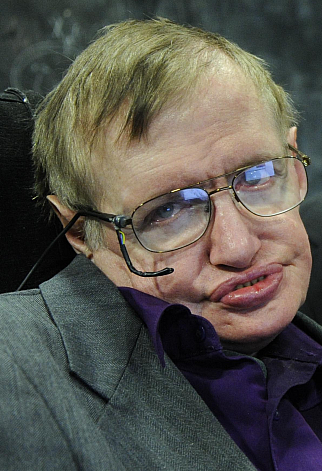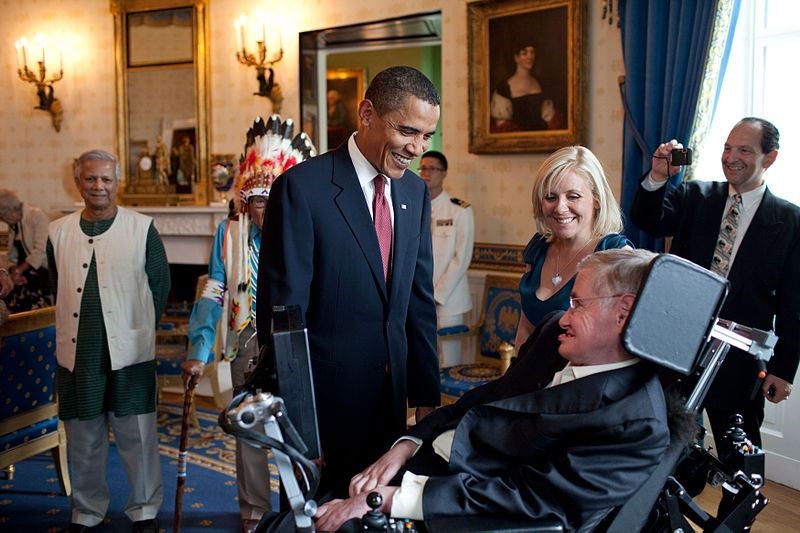"Look up at the stars and not down at your feet. Try to make sense of what you see, and wonder about what makes the universe exist. Be curious." -Stephen Hawking
Do you remember that one famous scientist in that wheelchair, who has had movies and books written about him? That guy who needed to use a small sensor to talk, because he had lost the ability to. That guy who contracted Lou Gerhig's disease at a young age but continued to share his knowledge with the world. Finding out you’re diagnosed with a life changing disease can be life stopping for some but it didn’t stop Stephen Hawking. Stephen Hawking was a scientist who studied cosmology, space, and physics. He was born on January 8th, 1942 and died March 14, 2018. Hawking was diagnosed with ALS at the shocking young age of 21 and was given 2 ½ years to live by doctors. However, he continued strong in his research and ended up exceeding the life expectancy of the doctors by almost 50 years! A hero must possess passion and strength in their life. Stephen Hawking has passion and strength which helped him outlive the doctors life expectancy and continue in his groundbreaking research, which shows he is a hero.
 https://commons.wikimedia.org/wiki/File:Stephen_Hawking_2013.pnghttps://commons.wikimedia.org/wiki/File:Stephen_Hawking_2013.pngStephen Hawking was passionate about his work in the physics of the universe. After being diagnosed with ALS, Hawking’s passion for his work only grew stronger. “In the early 1960s Hawking contracted amyotrophic lateral sclerosis, an incurable degenerative neuromuscular disease. He continued to work despite the disease’s progressively disabling effects.” (Britannica) Hawking was passionate about his work even after he was diagnosed and his body had started to waste away. Sometimes people will just stop their life because they get diagnosed with a life changing disease but he continued with his research despite the diseases’ toll on his life. “Hawking presented his theory in February of 1974 in a paper titled "Particle Creation by Black Holes." At first, many of his fellow physicists were skeptical, even to the point of outrage. But in the years following Hawking's initial proposal, other researchers have produced concurring evidence of what is now called “Hawking's radiation’” (Stephen Hawking) Hawking’s passion for his work and his theories eventually paid off because they got proven and named after him. He showed everyone that you can do anything if you believe in yourself and what you are passionate about. He lived longer than most doctors expected and in that time he proved theories that everyone else thought was impossible. Overall Hawking was passionate about his work in physics and cosmology which earned him many awards and he even got theories named after him.
https://commons.wikimedia.org/wiki/File:Stephen_Hawking_2013.pnghttps://commons.wikimedia.org/wiki/File:Stephen_Hawking_2013.pngStephen Hawking was passionate about his work in the physics of the universe. After being diagnosed with ALS, Hawking’s passion for his work only grew stronger. “In the early 1960s Hawking contracted amyotrophic lateral sclerosis, an incurable degenerative neuromuscular disease. He continued to work despite the disease’s progressively disabling effects.” (Britannica) Hawking was passionate about his work even after he was diagnosed and his body had started to waste away. Sometimes people will just stop their life because they get diagnosed with a life changing disease but he continued with his research despite the diseases’ toll on his life. “Hawking presented his theory in February of 1974 in a paper titled "Particle Creation by Black Holes." At first, many of his fellow physicists were skeptical, even to the point of outrage. But in the years following Hawking's initial proposal, other researchers have produced concurring evidence of what is now called “Hawking's radiation’” (Stephen Hawking) Hawking’s passion for his work and his theories eventually paid off because they got proven and named after him. He showed everyone that you can do anything if you believe in yourself and what you are passionate about. He lived longer than most doctors expected and in that time he proved theories that everyone else thought was impossible. Overall Hawking was passionate about his work in physics and cosmology which earned him many awards and he even got theories named after him.
Hawking's quality of strength helped him get through living with his disease and going through seeing what it did to his body. Stephen Hawking often got frustrated at his body for degenerating, but he managed to pull through and stay strong to continue his research so he could share his knowledge with the world. “Despite his illness, Hawking refuses to limit his life or work. He travels internationally, giving lectures on astrophysics. In 2007, he experienced weightlessness on a modified aircraft at the Kennedy Space Center in Florida. Hawking’s honors include the Royal Society's Copley Medal and the Presidential Medal of Freedom.” (Mills) Hawking didn’t let what was happening to his body stop him from doing things he wanted to do in his life. His strength allowed him to continue to give lectures even after he lost the ability to speak or walk. He had the strength to continue to live and study the universe. “He was the holder of numerous awards and honors, including Pius XI Gold Medal from the Pontifical Academy of Sciences, 1975; Dannie Heineman Prize for Mathematical Physics from the American Physical Society and the American Institute of Physics, 1976; Royal Astronomical Society Gold Medal, 1985; the Paul Dirac Medal and Prize from the Institute of Physics, 1987; the Britannica Award, 1989; and the Copley Medal, 2006; Presidential Medal of Freedom, 2009; Fundamental Physics Prize from Russia, 2012” (Stephen Hawking) Hawking won many awards and medals for his groundbreaking work, many of them after he started to have symptoms of ALS. He used his strength to help him continue with his research and win all the awards he did. He serves as a inspiration to others when they feel like they can’t do something because of a disease or injury. They just have to believe in themselves and live their life to the fullest with strength and passion for what they do. Despite his disease stripping him of his ability to talk or walk or even feed himself, Hawking managed to have enough strength to prove his theories and in doing is he won many awards.
 Barack Obama speaks with Stephen Hawkinghttps://commons.wikimedia.org/wiki/File:Barack_Obama_speaks_to_Stephen_Hawking.jpgThe strength and passion Stephen Hawking possessed helped him through his frustration about his body shutting down and helped him to continue to share his knowledge with the world. His passion is shown when he continues his research even after the disease hits him. His strength helped him finish strong in life, because he accomplished way more than most people would’ve thought he could. Stephen Hawking inspires me and others because even after he was diagnosed with ALS, which is where the body shuts down on itself, but he still found a way to continue his research and live longer than what the doctors thought he could. Even though the doctors told him he only had a couple years of his life left to live, Hawking dedicated those few years he thought he had to his research so he could share the knowledge he had about the universe with everyone.
Barack Obama speaks with Stephen Hawkinghttps://commons.wikimedia.org/wiki/File:Barack_Obama_speaks_to_Stephen_Hawking.jpgThe strength and passion Stephen Hawking possessed helped him through his frustration about his body shutting down and helped him to continue to share his knowledge with the world. His passion is shown when he continues his research even after the disease hits him. His strength helped him finish strong in life, because he accomplished way more than most people would’ve thought he could. Stephen Hawking inspires me and others because even after he was diagnosed with ALS, which is where the body shuts down on itself, but he still found a way to continue his research and live longer than what the doctors thought he could. Even though the doctors told him he only had a couple years of his life left to live, Hawking dedicated those few years he thought he had to his research so he could share the knowledge he had about the universe with everyone.
Works Cited
Britannica, The Editors of Encyclopaedia. “Stephen Hawking.” Encyclopædia Britannica, Encyclopædia Britannica, Inc., 10 Mar. 2019, www.britannica.com/biography/Stephen-Hawking.
Mills, Andrea, and S. A. Caldwell. 100 Scientists Who Made History: Remarkable Scientists Who Shaped Our World. DK Publishing, 2018.
"Stephen Hawking." Newsmakers, Gale, 1990. Student Resources In Context, https://link.galegroup.com/apps/doc/K1618002264/SUIC?u=powa9245&sid=SUIC&xid=190194ad. Accessed 3 May 2019.
Page created on 5/15/2019 3:46:18 PM
Last edited 12/9/2024 2:13:38 PM
